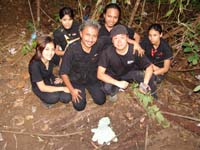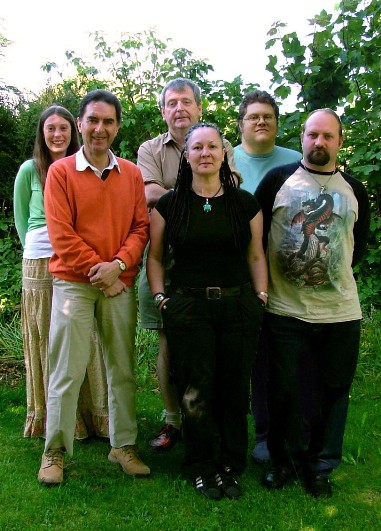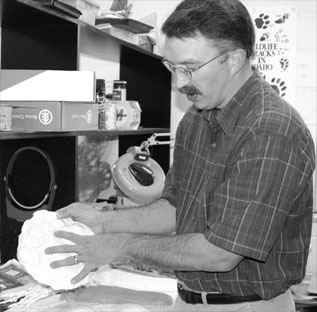
January 18, 2007

What can job seekers find out about you by looking at your FaceBook, YouTube, and Wikipedia? Doing a search for you and your activities via Google, Yahoo, MSN Search, Quintura, or yes, by visiting Ask Jeeves would reveal what? Have you been mentioned in Cryptomundo, at The Anomalist, or on Boing Boing? Well, maybe Boing Boing would just be cool, right?
Anyway, that’s been a concern, hasn’t it? It has been discussed in job career internet sites for awhile. College placement services have been feeding into the fears. Recent college graduates who only two years ago had posted their beer bash pictures (and more) online have begun to panic that their potential future employers might be surfing the web to find out all about them. Some people have even worried about their links to cryptozoology. But what if you actually were on a past expedition looking for the Death Worm, Mothman or Sasquatch? That info is out there too.
What if this fear of discovery is all being too overemphasized and the negative ridicule factor is being overblown?
Can an interest in cryptozoology merely make you a little more human? More open-minded? More intriguingly to those serving as the entryways to your academic wishes? Or to your next boss?
And how about your power in your job or academic hunts?

This game can be played two ways.
The search committees are not the only people using Wikipedia these days. The increasing use of Wikipedia and other internet searching can take place in the other direction.
Nora L. Corrigan is a doctoral candidate in Renaissance literature at the University of North Carolina at Chapel Hill. She writes of her search for her first tenure-track job, in an article in today’s Chronicle of Higher Education, entitled “Too Much Information?”
You might be pleasantly surprised by the example she utilizes.
The following is a selection from the beginning one-fourth of her article, which I extract here, through her interesting plateau conclusion that can be directly applied to your cryptolife.
Corrigan writes:
“The wiki is evil,” said one of the other graduate students in my department, referring to the Web site where job candidates share information about the status of various searches.
The rest of us nodded knowingly.
“But if I know it’s evil, why can’t I stop looking at it?”
Most academic job-seekers are information addicts. We like to do research. It’s what we do best, and it’s easier to do now than it has ever been before.
Ten years ago, when I started checking out doctoral programs, departmental Web pages were businesslike. I counted myself lucky if I could find a list of faculty members online, let alone any information about graduate-student life or the courses I might be teaching. These days, a few clicks on most departmental Web sites reveal photo galleries, detailed course syllabi and CV’s, and the occasional blog.
While doing research on job openings, I often found myself browsing the faculty profiles and learning that one of my potential colleagues had a young son who collected coins — or, in one memorable instance, that the head of the search had published an article about Bigfoot.
I found those bits of information encouraging. They made the search committees seem less like capricious gods and more like human beings and potential colleagues.
So job seekers, maybe putting cryptozoology and hominology – and your articles and quests for Bigfoot – out there in the world of your virtual resume could actually help! You never can tell, anymore, who is sitting on the other side of that interviewing table. Well, that is, unless you do your own research!

About Loren Coleman
Loren Coleman is one of the world’s leading cryptozoologists, some say “the” leading living cryptozoologist. Certainly, he is acknowledged as the current living American researcher and writer who has most popularized cryptozoology in the late 20th and early 21st centuries.
Starting his fieldwork and investigations in 1960, after traveling and trekking extensively in pursuit of cryptozoological mysteries, Coleman began writing to share his experiences in 1969. An honorary member of Ivan T. Sanderson’s Society for the Investigation of the Unexplained in the 1970s, Coleman has been bestowed with similar honorary memberships of the North Idaho College Cryptozoology Club in 1983, and in subsequent years, that of the British Columbia Scientific Cryptozoology Club, CryptoSafari International, and other international organizations. He was also a Life Member and Benefactor of the International Society of Cryptozoology (now-defunct).
Loren Coleman’s daily blog, as a member of the Cryptomundo Team, served as an ongoing avenue of communication for the ever-growing body of cryptozoo news from 2005 through 2013. He returned as an infrequent contributor beginning Halloween week of 2015.
Coleman is the founder in 2003, and current director of the International Cryptozoology Museum in Portland, Maine.
Filed under Abominable Snowman, Bigfoot, Breaking News, Cryptomundo Exclusive, CryptoZoo News, Cryptozoologists, Cryptozoology